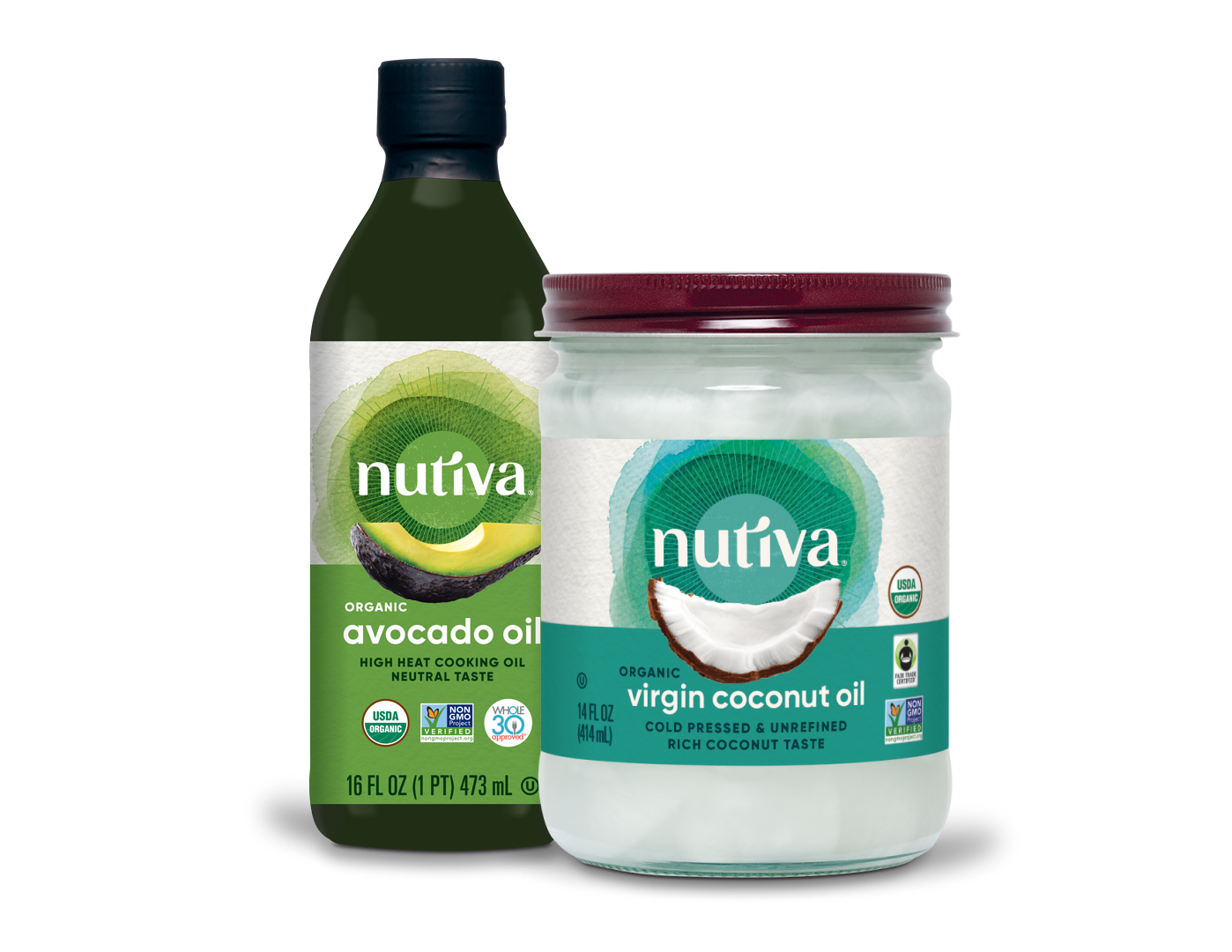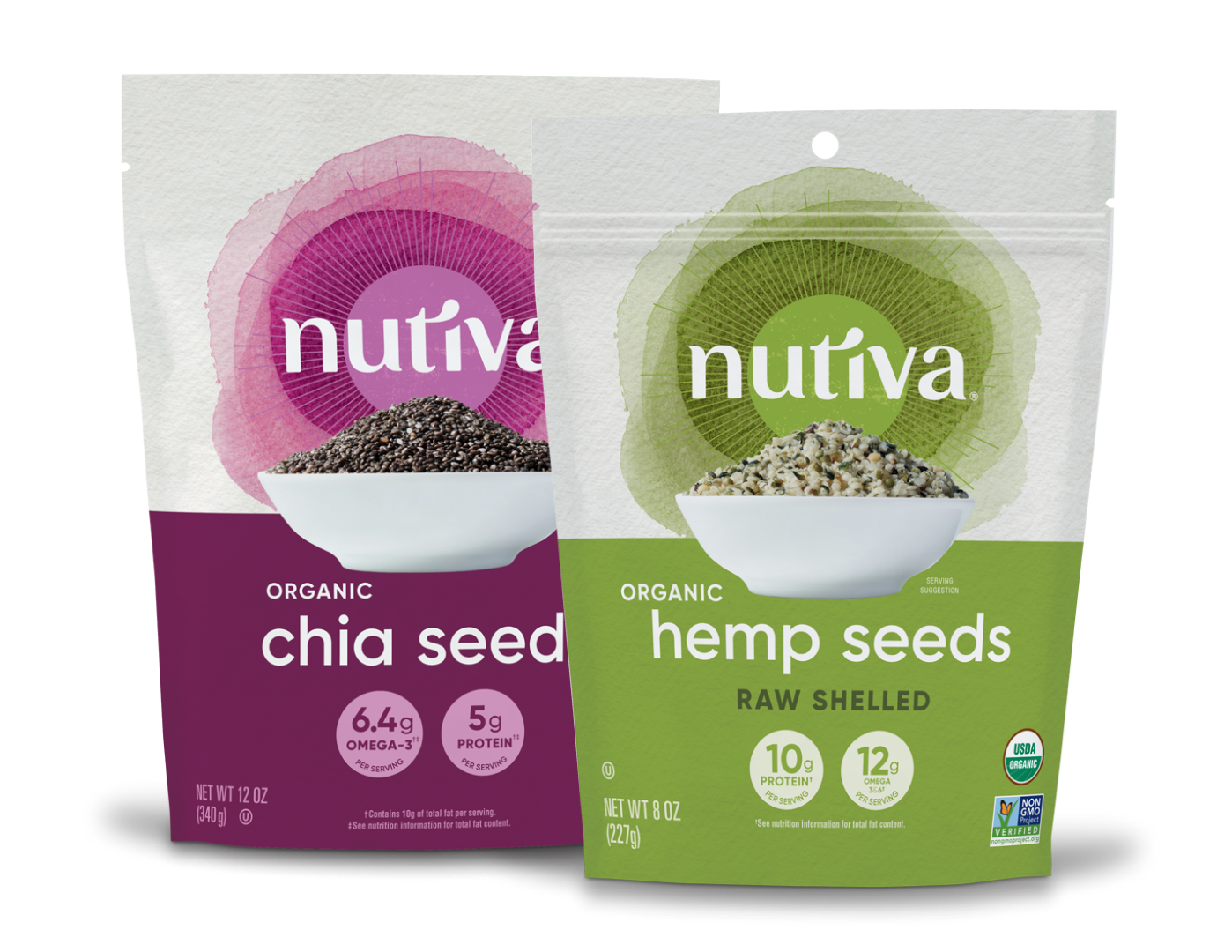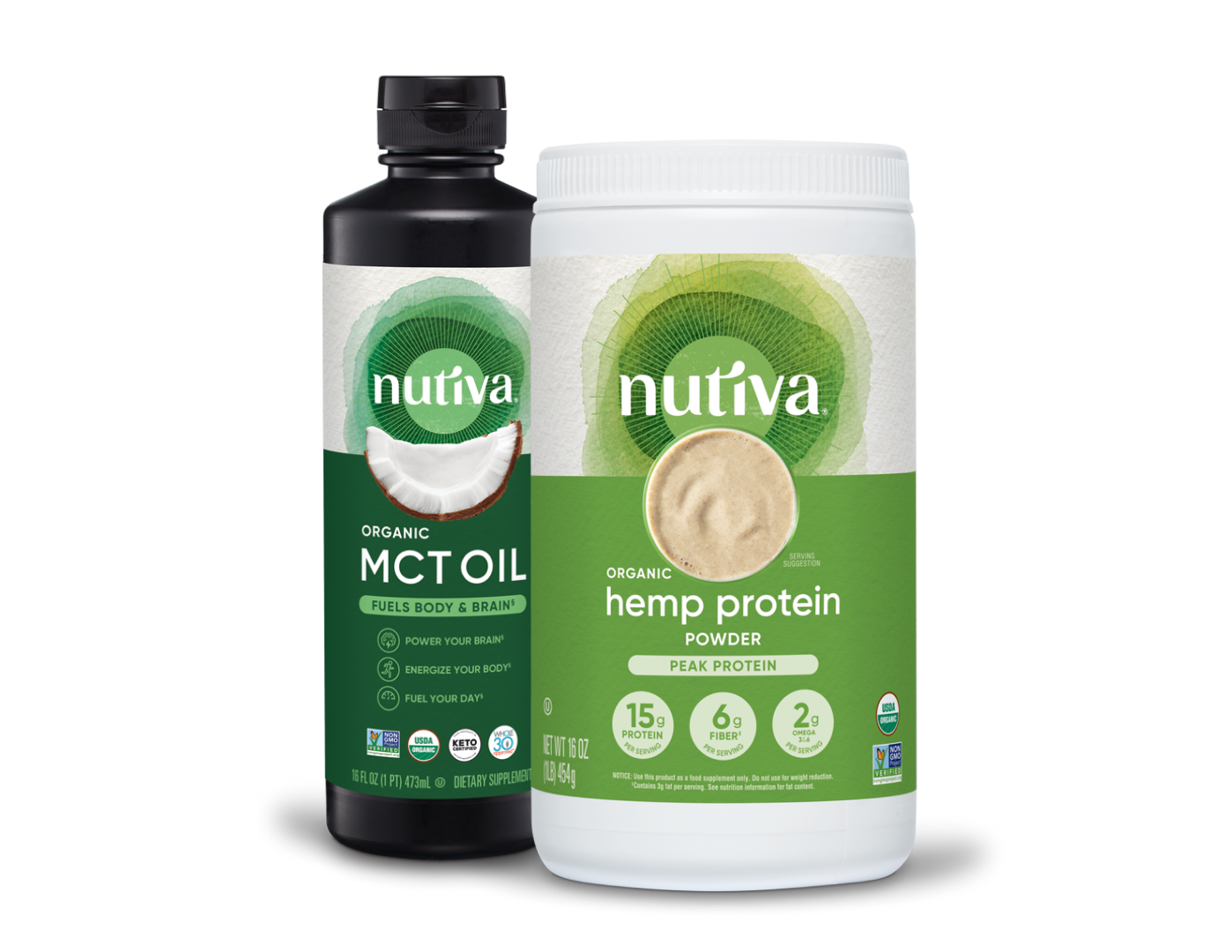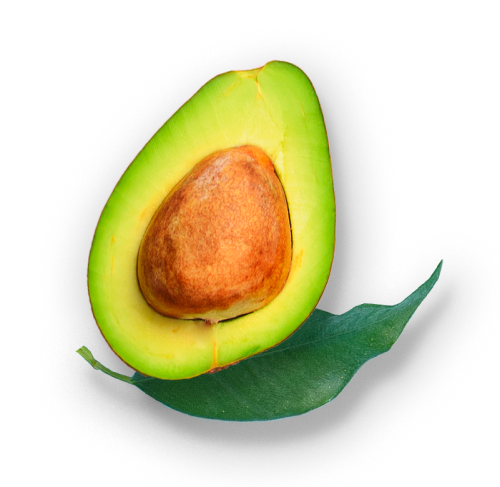7 heart healthy seeds
For American Heart Month this February, we are sharing our favorite 7 heart healthy seeds.
According to Million Hearts, “Heart disease is the leading cause of death for American women and men, accounting for 1 in 4 deaths in the United States. Nearly half of Americans have at least one risk factor for heart disease, such as high blood pressure, obesity, physical inactivity, or an unhealthy diet.
At Nutiva, we nurture vitality by conscious curating of the world’s finest organic plant-food ingredients. Maintaining a healthy diet is part of our mission through revolutionizing the way the world eats.
In fact, we are so passionate about it that we have an entire website dedicated to it!
But for today, we simply want to share with you 7 heart healthy seeds to include as part of a heart-healthy diet.
Click HERE to save this post for later.

According to the Mayo Clinic, “Polyunsaturated fats, found in certain fish, avocados, nuts and seeds, also are good choices for a heart-healthy diet.” These are some of our favorites.
These seeds are some of our favorites.
hempseeds
Cultivated for thousands of years throughout Asia and the Middle East before finally making its way to Europe and then the Americas, hemp is an extremely versatile and hardy plant. It is rich in protein, with omega-3 and minerals, and is the world’s most nutritious seed.

The hemp seed is the richest known source of polyunsaturated fats, containing a perfect 3:1 ratio of omega-6 linoleic acid and omega-3 linoleic acid. In fact, the hemp seed balance of Omega 3 to 6 fats is the perfect proportion for human dietary needs, making hemp an ideal addition to a healthy diet and lifestyle.
Incorporate it into your diet: Simple ideas, Savory Hempseed Flatbread, Spiral Zucchini “Spaghetti” with Basil and Hempseed Pesto, Low Carb Bread, and Buttery Vegan Riced Cauliflower.
sesame seeds
Sesame seeds add a nutty taste and a delicate, almost invisible, crunch to many Asian dishes. They are also the main ingredients in tahini (sesame seed paste) and the wonderful Middle Eastern sweet call halvah.
Sesame seeds are very high in calcium, magnesium, zinc, fiber, iron, B1 and phosphorus, sesame seeds are unique in their chemical structure. Possessing important cholesterol-fighting fibers known as lignans, studies show that these seeds can lower blood pressure, as well as protect the liver from damage.
Incorporate them into your diet: Superfood Seed Crackers, Cold Soba Noodle Slaw with Green Goddess Dressing, and Brown Rice Noodles with Peanut Sauce and Kale.
sunflower seeds
Sunflower seeds are the gift of the beautiful sunflower that has rays of petals emanating from its bright yellow, seed-studded center. The flower produces grayish-green or black seeds encased in tear-dropped shaped gray or black shells that oftentimes feature black and white stripes. Since these seeds have a very high oil content, they are one of the main sources of polyunsaturated oil.
The high supply of antioxidant Vitamin E (80% of your daily recommended value in every ¼ cup of seeds) helps to reduce body-wide dangerous inflammation from leading to various diseases. Vitamin E, also known as gamma-tocopherol, is a powerful antioxidant that is found in nuts and seeds including sunflower seeds (1). (Source)
Incorporate them into your diet: Power Smoothie Bowl, Raisin Nut Bites, Cacao Kapows, and Hemp and Coconut Oil Infused Quinoa and Potatoes Recipe.
chia seeds
The people of the ancient Aztec and Mayan empires revered chia seeds as vital nourishment. These mighty, gluten-free seeds, packed with omega-3, protein, rare antioxidants and fiber, are making a strong comeback in the 21st century.

Chia seeds are an excellent source of essential minerals such as phosphorous, manganese, calcium, sodium and potassium. In fact, to provide a comparison, we created this graphic to help illustrate how a tiny seed can have such a mighty punch!
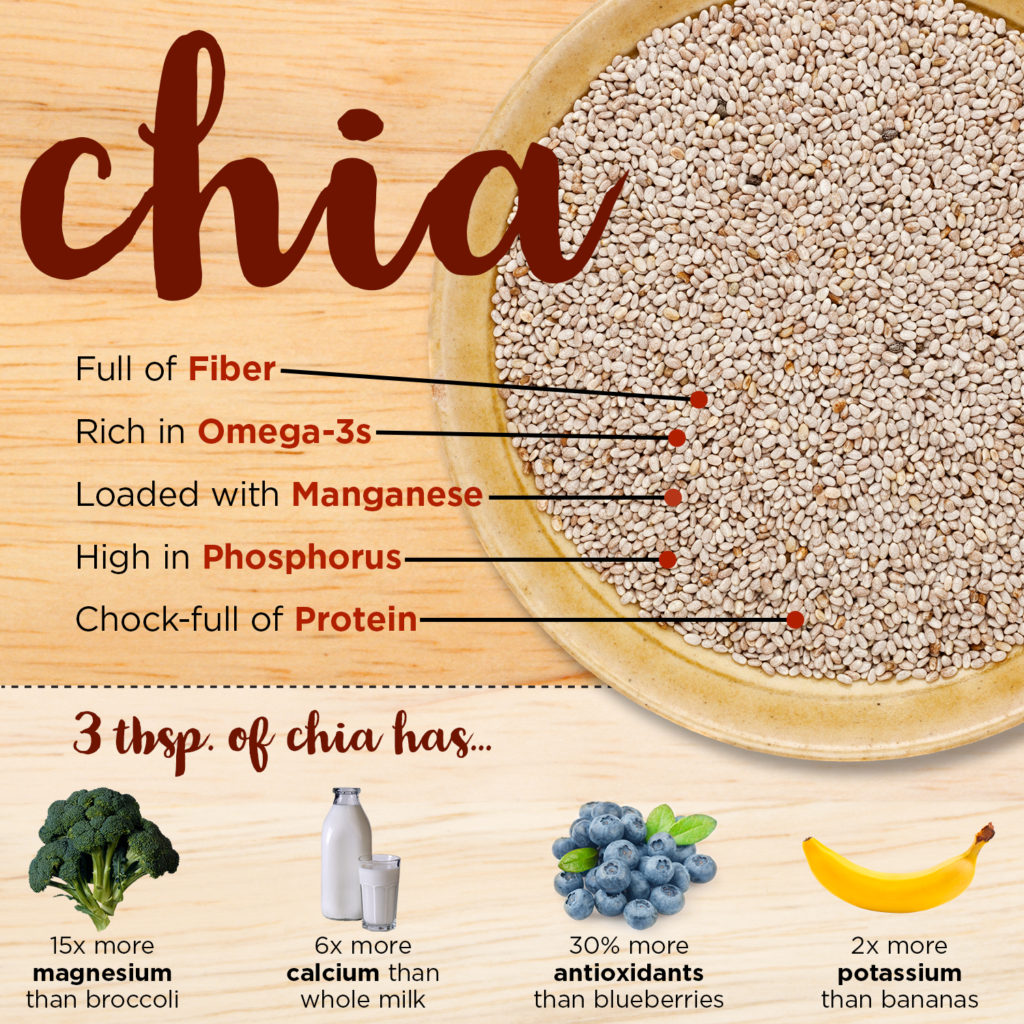
Incorporate them into your diet: Simple ideas, Blueberry Chia Seed Jam, Chocolate Chia Pudding Parfait, Coconut Blueberry Muffins, Lavender Chia Pudding with Blueberries and Figs, and Superspeed Granola Bars.

pumpkin seeds
Pumpkin seeds—also known as pepitas—are flat, dark green seeds. Some are encased in a yellow-white husk (often called the “shell”), although some varieties of pumpkins produce seeds without shells. Pumpkin seeds have a malleable, chewy texture and a subtly sweet, nutty flavor.
Pumpkin seeds are high in a form of antioxidant known as carotenoids, a special plant derivative that enhances immune activity and disease fighting capacities. These seeds are also high in omega-3 fatty acids and zinc, two important nutrients that may play a role in supporting skeletal health. Finally, pumpkin seed are high in phytosterols, plant components that aid in keeping stable levels of cholesterol and enhanced immune response.
Incorporate them into your diet: Red Quinoa and Porcini Mushroom Pilaf, Maca Maple Chia Granola, and Persian Spice Butter.
superseed blend (featuring flax seeds)
There is an Organic Superseed Blend that includes chia seeds, hempseeds and flax seeds. We’ve included chia seeds and hemp seeds already on the list, but we didn’t want to forget about the almighty flaxseed.

The seeds come from flax, one of the oldest fiber crops in the world – known to have been cultivated in ancient Egypt and China.
According to WebMD, the top three benefits of flaxseeds include:
- Omega-3 essential fatty acids, “good” fats that have been shown to have heart-healthy effects. Each tablespoon of ground flaxseed contains about 1.8 grams of plant omega-3s.
- Lignans, which have both plant estrogen and antioxidant qualities. Flaxseed contains 75 to 800 times more lignans than other plant foods.
- Fiber. Flaxseed contains both the soluble and insoluble types.
With the Superseed Blend, it’s easy to get a boost of flaxseed (plus chia seed and hempseed) into your everyday diet.
Incorporate them into your diet: Build the Best Ever Breakfast Bowl, Berry Almond Smoothie, or try any of these simple ways.
wheat germ
Tiny in size, but a nutrient-rich powerhouse, wheat “germ” (short for germination) is the part of wheat that sprouts and grows into a new plant. (Source)
Wheat Germ is packed with important B vitamins — such as folate, thiamin, and vitamin B6 — and the minerals zinc, magnesium, and manganese. It also has a high oil content and subsequently a high amount of vitamin E, an antioxidant that helps protect the oil in the wheat germ from quickly becoming rancid. Vitamin E functions in a similar manner as a fat-soluble antioxidant in the human body where it helps protect fat-containing substances including cell membranes, brain cells, and fatty molecules such as cholesterol from damage by free radicals.
Incorporate them into your diet: Try these 10 Delicious Ways to Use Wheat Germ.
Question: of the 7 heart healthy seeds we covered, which is your favorite? Or do you have a different favorite seed? Let us know in the comments below.



